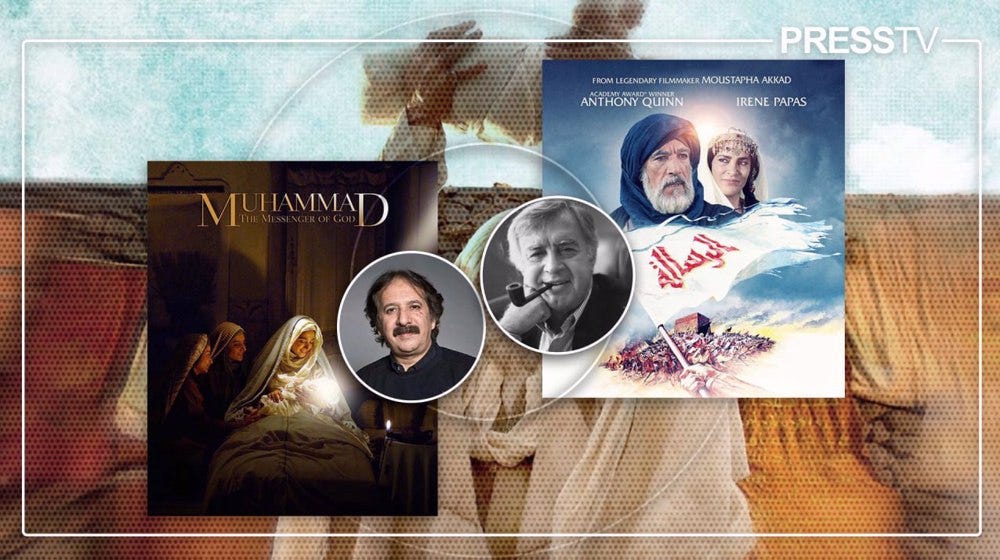Illuminating the Light
A Cinematic Review of Two Masterpieces on the Life and Mission of Prophet Muhammad (PBUH)
As the world marks 1,500 years since the birth of the Final Messenger, two cinematic masterpieces stand out for their efforts to bring the message of Islam to life through the lens of art and storytelling: Muhammad: The Messenger of God (2015), directed by Majid Majidi, and The Message (1976), directed by Moustapha Akkad.
Despite being made nearly four decades apart, both films offer profound and complementary portrayals of the Prophet’s life and mission, capturing the spiritual, historical, and moral depth of his legacy.
Majid Majidi’s Muhammad: The Messenger of God (2015)
Majid Majidi’s film takes a unique and emotionally evocative approach, focusing not on the battles and politics of the Prophet’s later life, but on the sacred beauty of his beginnings. The story centers on the early childhood of the Prophet Muhammad (PBUH), starting even before his birth, with cosmic events and signs that foretell the coming of a mercy to the worlds.
Viewers are immersed in the atmosphere of Mecca through awe-inspiring cinematography and a powerful musical score composed by the Oscar-winning A. R. Rahman. From the trembling of the idols to the tremors in the palace of Khosrow, everything points to the monumental nature of his arrival. The scenes portraying the Prophet’s foster mother Lady Halima are particularly moving, as light and blessing begin to descend upon her household after taking in the orphan child.
Majidi’s direction is both reverent and poetic. The Prophet’s face is never shown—a choice rooted in Islamic principles—and yet his presence is strongly felt through the reactions of others and the light that surrounds him. The use of symbolic imagery conveys the divine mission in a deeply spiritual and cinematic way.
The film also deals sensitively with the social injustices of pre-Islamic Arabia, including poverty, idol worship, and the tragedy of female infanticide. These are not simply historical depictions but serve as narrative foundations for the values the Prophet would later champion.
A standout scene is the Prophet’s journey to Syria, where a Christian monk named Bahira recognises in him the signs of prophethood—a moment that bridges Islamic tradition with a broader Abrahamic context.
With a production budget of over $20 million, extensive research, and elaborate sets built in Qom and other locations, the film took seven years to complete. It is a cinematic labor of love and spiritual conviction.
Full Movie: Muhammad: The Messenger of God
Moustapha Akkad’s The Message (1976)
In contrast to Majidi’s lyrical focus on childhood, The Message by Moustapha Akkad spans the full arc of the Prophet’s mission—from the first revelations in Mecca to the final triumph in the conquest of Mecca. This film is an epic in every sense, both in narrative scope and cinematic execution.
It opens with the momentous event of revelation and quickly moves through the trials faced by the early Muslim community: persecution, migration, and war. Akkad’s film brings history to life through the depiction of events like the migration to Abyssinia, the battles of Badr and Uhud, and the Treaty of Hudaybiyyah. It illustrates not only the hardships but also the Prophet’s unwavering patience, mercy, and strategic brilliance.
Akkad also made the conscious and respectful choice to never show the Prophet’s face or voice. His presence is instead conveyed through other characters—like Bilal ibn Rabah, Hamza ibn Abdul-Muttalib, and Abu Sufyan—allowing viewers to witness the message unfold through their experiences.
One of the most powerful scenes is the moment Bilal, a freed Ethiopian slave, ascends the Kaaba to deliver the first call to prayer—his voice echoing the spiritual equality Islam brought to a society steeped in tribalism and racial hierarchy.
The film’s strength lies in its historical authenticity and emotional resonance. Akkad consulted with Islamic scholars across the Sunni and Shia worlds to ensure theological accuracy, and he produced both English and Arabic versions to reach wider audiences.
Despite being made in 1976, The Message continues to move hearts, teach history, and awaken spiritual reflection.
Full Movie: The Message
Two Visions, One Light
Both films succeed in offering a cinematic expression of the life of the Prophet Muhammad (PBUH), each from a different but complementary angle. Majidi's work is poetic, intimate, and mystical. Akkad’s is epic, political, and historical. One invites you to feel the mercy of the Messenger as a child whose presence brings blessings; the other calls you to witness the revolution he led with faith, justice, and patience.
Neither film attempts to define the Prophet in totality—no film ever could—but both contribute profoundly to helping Muslims and non-Muslims alike understand his message and legacy.
As we reflect on 1,500 years since his birth, these films serve not only as tributes to the Prophet’s life but also as calls to action: to revive his teachings, uphold his ethics, and spread the light of his mercy in a world still in need of guidance.
Source: PressTv


